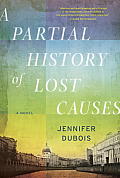
In promoting
A Partial History of Lost Causes, I've fielded some questions about what it was like to write across gender ? to enter the point of view of a man, Aleksandr, and stay there for 30 years of his life. Those questions have made me think in a broader sense about what writing across gender means: what it implies, who is expected to do it, how it relates to some of the most vexing ontological questions about women that have preoccupied the country of late, and how, perhaps, it can help to address them.
I don't think it's terribly controversial to note that women, from a young age, are required to consider the reality of the opposite gender's consciousness in a way that men aren't. This isn't to say that women don't often misunderstand, mistreat, and stereotype men, both in literature and in life. But on a basic level, functioning in society requires that women register that men are fully conscious; it is not really possible for a woman to throw up her hands and write men off as eternally unknowable space aliens — and even if she says she has, she cannot really behave as though she has. Every element of her life — from reading books about boys and men to writing papers about the motivations of male characters to being attentive to her own safety to navigating most any institutional or professional or economic sphere — demands an ironclad familiarity with, and belief in, the idea that men really are fully human entities. And no matter how many men come to the same conclusions about women, the structure of society simply does not demand so strenuously that they do so. If you didn't really deep down believe that women were, in general, exactly as conscious as you, you could probably still get by in life. You could probably still get a book deal. You could probably still get elected to office.
This discrepancy plays out in fiction, where it fuels a literary cycle which is both a cause and a consequence of the broader issue. Girls, alongside the variety of other ways in which they're confronting the reality of male consciousness, read and write papers about Huck and then Holden and then Jake Barnes. In doing so, they learn that male minds, like female minds, are complicated and weird and worthy of attention. Adult female readers then will often voluntarily read books by and about both men and women, whereas male readers will overwhelmingly, though of course not exclusively, read books by and about men. And female writers will often also voluntarily write books populated by both men and women. (If they don't, they will have to be ever-mindful of the possibility of being understood as writers of "women's fiction" — meaning fiction for women only.) Male writers will have the latitude to do whatever they want: many will write books about both men and women, but they can excise women entirely from their fictional universes, if they want to, without ever marginalizing their books. And all of this results, of course, in a re-enforcement of the initial problem: the production of another realm where taking women seriously — as consciousnesses, narrators, characters — is optional.
Male writers' hesitation to use women as point of view characters seems to stem in part from a prevailing sense — perhaps not entirely unfounded — that one simply can't win, and that the tiniest gesture or cadence amiss could spark a frenzy. But a larger fraction of the hesitation seems to me to arise from two premises: first, the notion that women are essentially strangers, their consciousnesses wholly foreign; and second, that this foreignness, in addition to being unassailable, is also pretty limited and boring. A male writer who careens around in time, deviates from autobiography, or takes liberties with realism believes in the potential dramatic and aesthetic payoffs for doing so. Writing from a female point of view seems to be generally regarded as something more like writing from the perspective of a deer: you might get points for novelty, but it'd be impossible to get right, and who really wants to hear a deer narrate a story, anyway?
That is, of course, something of an overstatement. But I suspect that the notion that women's consciousnesses are so alien and reduced as to be generally unknowable is actually fairly widespread, I suspect it pervades our literary culture, and I suspect it explains a lot of recent political theatrics. But I also suspect that reading books with complicated female consciousnesses (any kind, as long as someone's actually driving!) can chip away at it, to some extent. If there's one thing that's unambiguously morally elevating about fiction, it's the way it forces us to confront the complexities of the brains of strangers, since all characters are strangers to us when we start a book. By engaging our attention and our curiosity, fictional people can make real people seem more real. And that means that writing female narrators is something of an ethical issue, as well as a literary one, for writers of both genders.